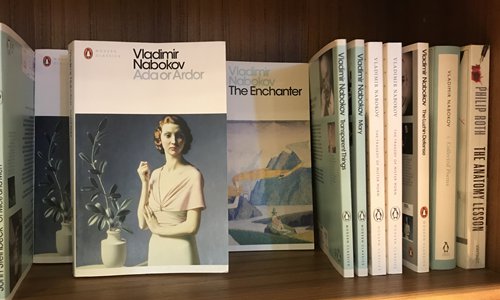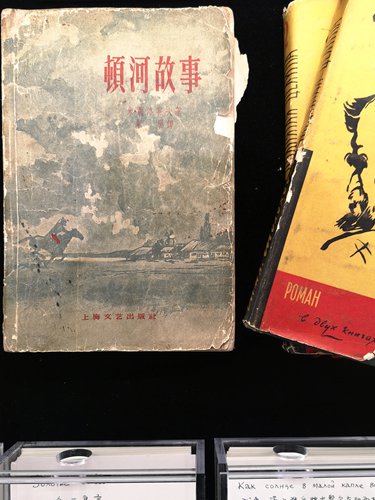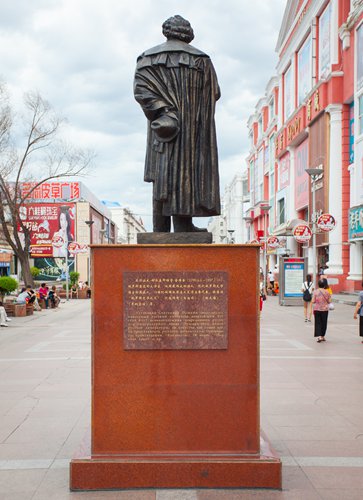HOME >> ARTS
China-Russia literature exchanges on the rise
By Chen Xi Source:Global Times Published: 2019/6/4 19:18:39

English editions of works by Russian author Vladimir Nabokov Photo: Bi Mengying/GT

Chinese editions of Russian works of literature Photo: IC

A statue of Alexander Pushkin in Heihe, Northeast China's Heilongjiang Province Photo: IC
If by life you were deceived,
Don't be dismal, don't be wild!
In the day of grief, be mild
Merry days will come, believe.
Are you familiar with this poem? Written by famous Russian writer Alexander Pushkin, the poem gave hope to many Chinese during the War of Resistance against Japanese Aggression(1931-45) and inspired them to work toward a better future.
The literary friendship between Russia and China has continued for more than a century, impacting the lives of countless Chinese over multiple generations.
The influential era
"China's formal acceptance of Russian literature began with the translation of The Captain's Daughter by Alexander Pushkin, the father of Russian literature, at the turn of the 19th century. One of the most influential eras for Russian literature in China was the New Culture Movement during the 1910s and 1920s, when foreign culture was introduced into China, feeding China's 'new literature,'" Liu Wenfei, the president of the Chinese and Russian Literature Research Association, told the Global Times.
"Russian literature spread throughout China very quickly and on a large scale during the New Culture Movement. It was very timely that Russian literature took root in China during this period because it echoed China's social and political needs at the time," said Liu.
According to Liu, Marxism was widely introduced into China beginning in 1918. Later, after the establishment of the Soviet Union, the first socialist country in the world, the country became a model for the Chinese people. Soviet culture and thought, including literature, naturally became a well of creativity for Chinese to draw upon.
"The influence of Russian literature on Chinese literature was enormous. Chinese liked to read classic Russian literary works, especially war literature. For example, many Chinese can recite the famous saying of Pavel Korchagin [the protagonist of socialist realist novel How the Steel Was Tempered,] about the liberation of humankind because it is so classic," Zhang Hongbo, the director-general of the China Written Works Copyright Society, told the Global Times.
Liu added that Chinese became especially interested in Soviet literature during World War II. Soviet war literature, such as They Fought for Their Country by Russian novelist and winner of the 1965 Nobel Prize in Literature Mikhail Sholokhov, and the short novel Days and Nights from war poet Konstantin Simonov, greatly inspired the Chinese people during the war. This tied Soviet literature and Chinese society even closer together.
Another high point for Russian literature as Chinese literature's "mentor and friend" was after the founding of the People's Republic of China in 1949. From then to December 1958, China translated 3,526 Russian literary works and printed 82 million copies, this accounts for roughly two-thirds of the total number of translated foreign literary works and three-quarters of prints during this period, according to The Comparison of Chinese Literature and Russian Literature of 20th Century.
Fading impact
Classic literary works stand the test of time. Even now, Chinese students' textbooks still include many Russian works of literature such as the above poem If Life Deceives You and the famous tale The Flower with Seven Colors. However, Russia's modern literature doesn't have the same hold on Chinese readers.
There are a variety of factors behind the declining influence of Russian literature in China. First is the dominance of English literature, which has squeezed out non-English literature. The second factor is related to the unprecedented diversification in Russian literature that occurred after the disintegration of the Soviet Union in 1991. According to Liu, the diverse array of works had a harder time to break into the mainstream in China.
"There are objective reasons behind this phenomenon. After the disintegration of the Soviet Union, social changes had a great influence on the publication and dissemination of literary works. Although the two countries have carried out a lot of efforts in contemporary literature, they still don't know each other very well," said Zhang.
Cultural communication
Zhang did note, however, that the two countries have been working hard to rectify this situation. The two nations have co-hosted many events in education, tourism and media to promote cultural exchanges and the dissemination of literary works in both countries.
According to Zhang, one particularly strong trend has been the translation, publication and dissemination of children's literature in China and Russia.
Additionally, Russia is interested in books about China's efforts in the fields of agriculture, e-commerce, mobile payments, high-speed trains, and lunar exploration, as well as science fiction works such as famed Chinese writer Liu Cixin's The Wandering Earth and The Three-Body Problem.
"I propose the concept of 'literary diplomacy.' That is, Russian literature can be an important starting point for cultural diplomacy between the two countries. Recently, the increased influence of Chinese literature around the world, the popularity of learning Chinese in Russia and the spread of Chinese literature in Russia has ushered in unprecedented and historic opportunities for Russian and Chinese scholars to communicate with each other. I believe that the literary diplomacy of the two countries will take some new steps forward in the coming years," said Liu.
Newspaper headline: Literary diplomacy
Posted in: BOOKS,CULTURE & LEISURE,ARTS FOCUS